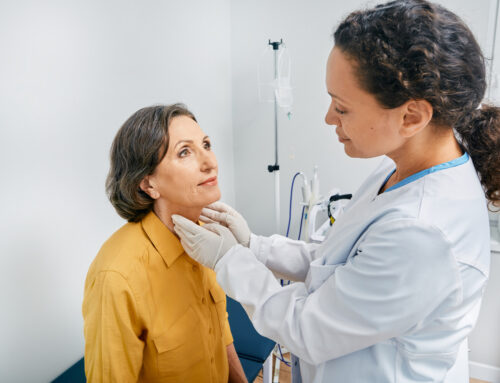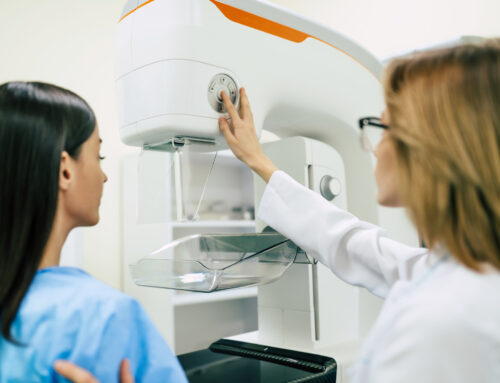
Most women diagnosed with ovarian cancer are not at high risk, and although there is no way to know for sure if you will get ovarian cancer at some point in your life, several ovarian cancer risk factors exist. For example, ovarian cancer risk may be increased if you take estrogen without progesterone for ten or more years. Other ovarian cancer risk factors include:
- Being middle-aged or older
- Having a family history of ovarian cancer
- Having a genetic mutation or abnormality
- A history of breast, uterine, or colon cancer
- A history of endometriosis
- Never giving birth or having trouble getting pregnant
These ovarian cancer risk factors will not definitely determine whether or not you will have ovarian cancer. However, it is still important to share your personal and family health history with your medical provider to assess your ovarian cancer risk. If you have a direct family history of ovarian cancer, speak to your doctor about genetic counseling to determine whether it is right for you and your preventative care.
What Can I Do to Reduce My Risk of Ovarian Cancer?
Just as there are ovarian cancer risk factors, there are forms of ovarian cancer prevention as well. The use of oral contraceptives, known as birth control pills, decreases the risk of developing ovarian cancer for average-risk women and BRCA mutation carriers, especially when used for several years.
Gynecologic surgery, such as tubal ligation and hysterectomy may also be successful in ovarian cancer prevention. Still, medical professionals agree that this more aggressive form of prevention should only be performed when medically necessary, such as a strong family history of ovarian and/or breast cancers.
Symptoms of Ovarian Cancer
Ovarian cancer symptoms are more likely to occur if the disease has spread. Still, early-stage cancer can cause ovarian cancer signs and symptoms to look out for as well, including bloating, pelvic or abdominal pain, trouble eating or becoming full quickly, feeling the urgency in urination and urination frequency. These ovarian cancer symptoms are often caused by non-cancerous diseases or cancers of other organs but can point to ovarian cancer when they occur more often or become more severe.
Ovarian cancer signs that may be present can include fatigue, upset stomach, back pain or pain during sex, constipation, swelling of the abdomen, weight loss, and/or changes or irregularities in a woman’s menstrual cycle. Suppose you are experiencing any combination or persistence of these ovarian cancer signs. In that case, we recommend promptly reaching out to your physician to take any necessary ovarian cancer prevention screenings to confirm or rule out the disease.
Ovarian Cancer Treatment
If you are diagnosed with ovarian cancer, you will be referred to a gynecologic oncologist trained in treating cancers of the women’s reproductive system. These specialists can perform necessary treatment to women with ovarian cancer, and these treatments typically involve a combination of surgery and chemotherapy. Consult your doctor about treatment options to create a treatment plan designed for your needs.
Ovarian cancer treatment includes surgery, or removal of the cancer tissue in an operation, and chemotherapy, in which special medication is used to reduce or eradicate the cancer. Chemotherapy can be administered through pill form or intravenously, and sometimes, both methods will be utilized in your treatment plan. Choosing a treatment plan can be difficult, but with your doctor, you can decide which options are best for you and your type of cancer.
Your healthcare provider can additionally teach you more information about the benefits and risks of each treatment, and any side effects you may encounter. Everybody reacts differently to different treatments and medications. You may even decide to seek out a second opinion or participate clinical trial, which uses new, innovative treatment options. By equipping yourself with information on all options, you can decide what is best for you.
Deciding On a Treatment Plan
Depending on multiple factors, such as what type of cancer you have and its severity, your personal preferences, whether you plan to have children, and considering your overall health, your treatment plan may vary. Many specialists will be part of your journey, including doctors, physician’s assistants, nurses, psychologists, sex counselors, nutritionists, social workers, and more. Doctors on your treatment team may include:
- Gynecologic oncologist – trained to treat ovarian cancer through surgery and administer chemotherapy and other medications in cancer treatment
- Radiation oncologist – trained to use radiation to treat cancer
- Medical oncologist – trained to use chemotherapy and other medicines to treat cancer
Ultimately, your care team is here to answer any and all questions or concerns you may have about your treatment options and plan of care and support you through this process. They will want to provide you with the tools necessary to make informed decisions about your treatment and your life. Here are some things you may want to, and should, ask your care team:
- What kind of ovarian cancer am I diagnosed with?
- Where, if at all, has my cancer spread?
- What stage of cancer am I diagnosed with?
- How can I afford treatment?
- Will treatment affect my fertility?
- What are my genetic testing options?
- What are my options, and what do you recommend?
- Can you recommend someone to give a second opinion?
- What is my outlook after treatment?
- How much time do I have to decide on a treatment plan?
- How can I prepare for treatment?
- How long will treatment take?
- What are the risks and side effects of my desired treatment plan?
- How can I avoid these risks and side effects?
- How will treatment affect my professional and day-to-day responsibilities?
- Can the cancer recur, and what would we do if it does?
- Should I arrange transportation or aftercare for treatment?
- When will treatment begin working against the cancer?
- Can I reduce the side effects of treatment?
- Do I need to notify you of any signs or symptoms?
- Do I have any limits or things to avoid during treatment?
- Can you refer me to a mental health specialist for support?
- What do I need to do after treatment is completed?
These questions seem tedious, and creating a treatment plan with your care team takes work, but you will find comfort in knowing what to expect and look out for before, during, and after treatment to help you through this difficult time. Not all of the above questions may apply to you and your diagnosis, but we recommend asking about those that do, and more, to help you feel secure in your care.
Local Treatment
Local treatment means treating or removing the cancerous tumor without affecting the rest of the body. There are a few kinds of local therapy typically used in ovarian cancer treatment, including surgery and radiation therapy. Surgery is usually the main treatment for the majority of ovarian cancers, and the extent and severity of surgery will depend on the stage of your cancer and if and where it has spread.
Surgery
If surgery requires removal of both ovaries and/or the uterus, you will be unable to become pregnant and early menopause will be induced if you are not already peri or postmenopausal. After surgery, you may need to remain in the hospital for up to a week, depending on the extent of the operation, and you may resume daily activities and responsibilities within six weeks from being discharged.
Radiation Therapy
In radiation therapy, high-energy x-rays or particles are used to kill cancer cells. Radiation therapy is not typically used because chemotherapy has been shown to be a more effective treatment option. However, radiation therapy is helpful in treating areas of the body or organs to which the cancer has spread. Radiation therapy’s common side effects, which usually resolve after treatment, include skin changes or irritation, fatigue, nausea and vomiting, diarrhea, and/or vaginal irritation or discharge.
Systemic Treatment
Systemic treatment is characterized by using drugs and medication to reach cancer cells almost anywhere in the body, which are given by mouth or is administered intravenously. The type of treatment used will depend on the type and stage of ovarian cancer. Systemic treatment includes chemotherapy, hormone therapy, and targeted therapy. You can consult with your care team to determine whether this more aggressive treatment is right for you and your diagnosis.
Chemotherapy
Chemotherapy means using drugs to treat cancer, and chemo is a systemic treatment in which the drugs enter the bloodstream and travel throughout the entire body. Combination therapy, meaning more than one chemotherapy drug, is often used as the best first line of treatment. Chemo is also useful in eradicating cancer cells lingering after surgery and can additionally be used to shrink large tumors to make surgery less extensive and more successful. Chemotherapy can be administered orally or intravenously or through intraperitoneal therapy, which is when the drugs are injected directly into the abdominal cavity through a catheter.
Intraperitoneal (IP) Chemotherapy
If you have been diagnosed with stage III ovarian cancer, meaning cancer that has not spread outside of the abdomen, and if your cancer had no tumors larger than one centimeter after surgery, IP chemotherapy may be a necessary addition to systemic chemotherapy treatment. By administering chemo in this manner, the drugs are going directly into the cancer cells in the abdominal cavity while also absorbing into the bloodstream to reach cancer cells outside the cavity as well. IP Chemotherapy is typically more successful than chemotherapy alone, but side effects tend to be more severe.
Chemotherapy Side Effects
Side effects may vary depending on the type of chemotherapy administered, the length of treatment, and the dosage. Common side effects of Chemotherapy include the following:
- Nausea
- Vomiting
- Loss of appetite
- Loss of hair
- Rashes on hands and feet
- Mouth sores
Chemotherapy may also lead to increased chance of infection due to low white blood cell counts, or leukopenia, bruising or bleeding easily due to low blood platelet counts, or thrombocytopenia, and fatigue due to low red blood cell counts or anemia. These side effects typically resolve after chemotherapy treatment is finished. It is important to communicate any side effects you are experiencing during treatment with your doctor and members of your care team. There may be ways to reduce your side effects, including medications that may help to prevent or lessen nausea and vomiting.
Hormone Therapy
Hormone therapy means using hormones or hormone-blocking drugs to battle cancer. Hormone therapy is considered systemic therapy, and it is most often used to treat ovarian stromal tumors. Certain drugs are administered to keep estrogen circulating in a woman’s body from stimulating cancer cell growth. Other hormone therapy drugs are used to block enzymes, or aromatase, from turning hormones into estrogen in post-menopausal women. Common side effects of this treatment include those similar to symptoms of menopause, such as hot flashes, vaginal dryness, joint and muscle pain, bone thinning, and more.
Targeted Therapy
Targeted therapy is the use of drugs to identify and then fight cancer cells without doing significant damage to other cells in the body. The types of targeted therapy in cancer treatment all work differently, but they are all sure to change how cancer grows, divides, repairs itself, and interacts with other cells. Some drugs are used to shrink or slow the growth of cancers, while others help to repair damaged DNA inside cells.
Side effects of targeted therapy may include nausea, diarrhea, vomiting, loss of appetite, fatigue, changes in taste, anemia or low red blood cell count, pain in the belly, muscles, and/or joints, and rarely, heart problems, confusion, abnormal liver tests, and/or blood cancers may occur. Like any medication, speak to your doctor and care team to determine whether the benefits outweigh the risks of any treatment plan.
Clinical Trials
You may be interested in joining a clinical trial, which are very carefully controlled and monitored research studies that explore promising new procedures or treatment options in state-of-the-art care. Though they are not right for everyone, it may be the only way to access new treatments. To learn more about clinical trials, speak to your doctor about offerings at your clinic or hospital and whether any trials are currently being conducted.
Care Coordination
Whatever treatment method you decide to embark on, make sure you speak to your doctor and care team to learn about all of your options and any resources you may need to make informed decisions about your care and cancer treatment. Whether you do or do not wish to go through treatment, you can still receive supportive care. Your cancer care team is here to help you understand your diagnosis, share treatment options, advise treatment options, and give you tips to maintain or improve your quality of life.
Support services can be a helpful addition to your care team to assist in social work services, financial aid, nutrition, rehab, or spiritual help and guidance. The American Cancer Society additionally offers programs and services to help you get through your cancer treatment. They are important so you understand your diagnosis, what treatment is recommended, and ways to maintain or improve your quality of life.
The TopLine MD Alliance is an association of independent physicians and medical practice groups who are committed to providing a higher standard of healthcare services. The members of the TopLine MD Alliance have no legal or financial relationship with one another. The TopLine MD Alliance brand has no formal corporate, financial or legal ties to any of the affiliated physicians or practice groups.



